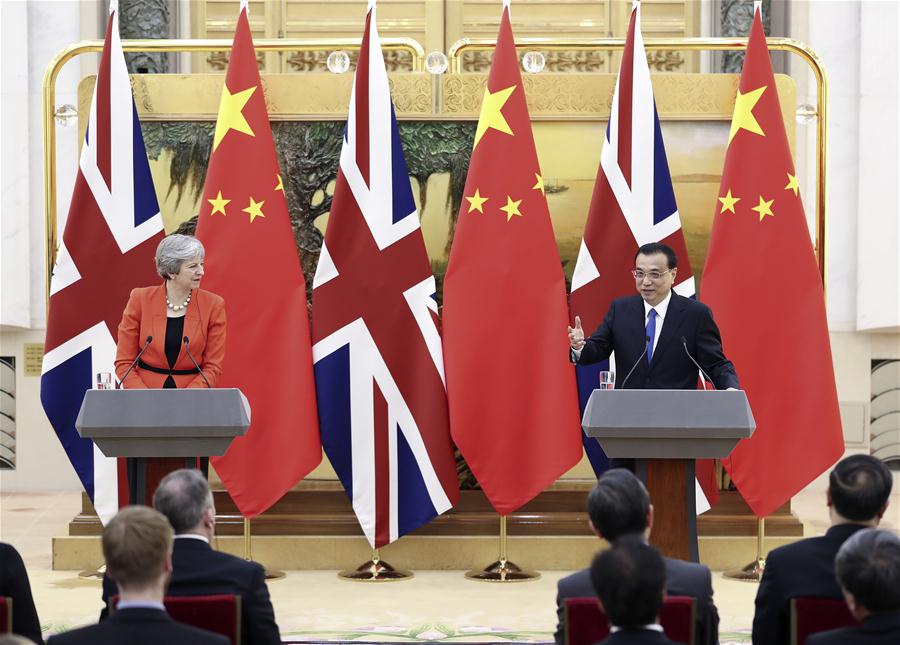What next for the UK-China 'Golden Era'?
- By Tim Collard
 0 Comment(s)
0 Comment(s) Print
Print E-mail China.org.cn, February 1, 2018
E-mail China.org.cn, February 1, 2018

British Prime Minister Theresa May arrived in China Wednesday morning for a three-day tour of Beijing, Shanghai and Wuhan. Her objective, of course, will be to intensify mutually beneficial trade and investment deals with China, in the wake of the U.K.'s decision to leave the European Union.
She said in advance of her trip: "There are huge trade opportunities in China that we want to help British businesses take advantage of. That is why I'm taking a large multi-sector business delegation with me, representing all corners of the U.K. and sectors in which the U.K. excels."
Her visit is intended to intensify the "Golden Era" in U.K.-China relations, announced as such during the state visit of President Xi Jinping in 2015, and to deepen cooperation on all fronts of the multifaceted relationship. With executives of over 50 leading companies and leading academic figures, this will be the largest business delegation Mrs May has taken with her on an official overseas visit.
Bilateral commercial relations have indeed prospered in the last few years. Since 2010, U.K. exports to China have risen by 60 percent, and inward investment, an especial current British priority, has also risen greatly; by 2020 it is expected that China will have become one of the U.K.'s leading foreign investors.
But it is abundantly clear that Mrs May will enter discussions with the Chinese leadership at a potential disadvantage. The central issue of Britain's relations with the EU are overshadowing everything at the moment, and her domestic position is far from secure. The Chinese side has made encouraging signals, suggesting that "golden fruits" may be available for the U.K. in China; but Mrs May will have to work hard to establish that she is not operating from a position of weakness.
She is not unaware that French President Macron was in China at the beginning of January, and that Macron, speaking not only for his own country but also for the EU, would like to strengthen relations with China at Britain's expense. Like the rest of the world, Western Europe is excited by the opportunities which may arise from China's Belt and Road Initiative, and it is clear that there will be many lucrative and mutually beneficial contracts up for grabs. Britain needs her share of these projects, with its attached financing, if a success is to be made of life outside the EU.
There are some doubts on the practicalities of full alignment with the objectives of the BRI on both sides of the English Channel. France has applied certain restrictions on Chinese investment in what Macron calls certain strategic sectors, and is attempting to extend these restrictions to the whole of the European Union, assuming a leadership role now that Britain is leaving and Germany still lacks a stable government. Britain is less averse to foreign direct investment, including from China, but has also expressed doubts about some of the perceived objectives of the BRI. It is hoped that Mrs May will be able to iron out some of these obstacles and offer a helpful environment for cooperation with China.
Her real battle, of course, will be to obtain the respect and confidence of the Chinese leadership. A senior British Sinologist, Professor Kerry Brown, said "She has got to obviously avoid the idea that she is going there with a begging bowl, even though, in fact, that is kind of what she is doing."
Of course, neither side in any bilateral relationship can expect to get something for nothing: Britain has to prove that she can provide the best products at the best price, and the best investment environment. Economic relations are not dictated by politics, and there is no reason why the Chinese side should need to take any notice of political rivalries between the U.K. and the European mainland. Britain cannot expect to succeed on anything but her own merits.
Nonetheless, it will be a great priority for Mrs May to emphasize that British goodwill and commitment to the relationship with China are a permanent factor, depending neither on relations with Europe nor on who is in government in London. China has offered Britain an upgrading of the bilateral relationship: Britain needs to make clear that this remains a most welcome offer, and that her government will do its level best to work hard at their side of this partnership.
China will give Mrs May the usual warm welcome offered to respected visitors. But she will be expected to learn some valuable lessons from her visit. And one of the main lessons will be that "golden fruits" cannot be plucked without a great deal of effort.
Tim Collard is a columnist with China.org.cn. For more information please visit:
http://www.ccgp-fushun.com/opinion/timcollard.htm
Opinion articles reflect the views of their authors, not necessarily those of China.org.cn.





